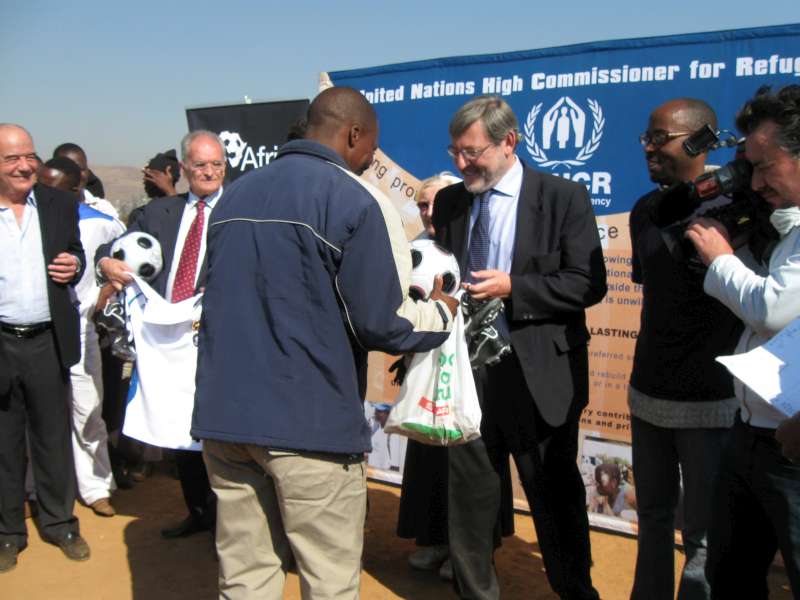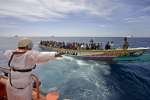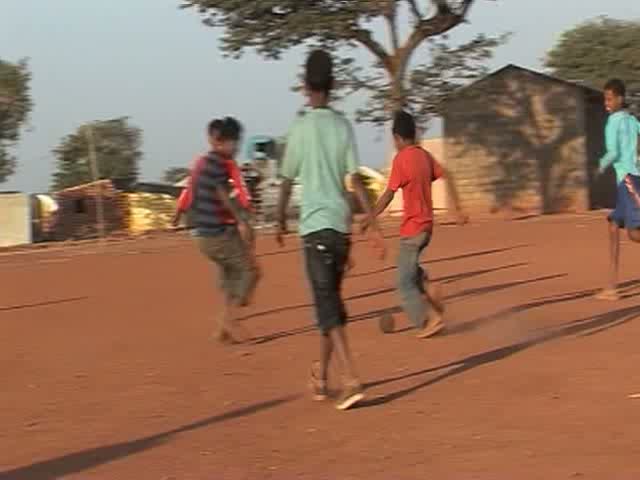Play4Africa arrives in Pretoria bearing gifts and support for refugees
News Stories, 28 June 2010
PRETORIA, South Africa, June 28 (UNHCR) – The Play4Africa initiative has handed over 2,000 footballs and 4,000 pairs of football boots to UNHCR's Pretoria office after completing a four-month road trip from Spain to South Africa.
An eight-vehicle convoy organized by the Spanish-based initiative left the port of Almeira on March 7 at the start of a journey to raise awareness about some of the key problems facing millions of young Africans, including poverty, infant mortality, lack of sports opportunities, disease, especially HIV and AIDS, malaria and water-borne diseases – and to reinforce their "right to play."
They arrived in Pretoria last Friday in time to visit the UNHCR office and then catch Spain's crucial 2-1 win over Chile in the group stages of the World Cup football finals. The aid donated by Play4Africa will be used to support UNHCR programmes in South Africa, including efforts to counter xenophobia.
On Saturday, the Play4Africa team gave direct support to one such initiative by attending a Peace Cup football match in Attridgeville township, 10 kilometres from Pretoria. The event was organized by the community based Xaveri Movement and funded by Caritas.
The visitors, including Spanish Secretary of State for Sports Jaime Lissavetzky and Jorge Carreto, president of the Spanish Football Association, which has also been supporting Play4Africa, were welcomed by some of the refugees and South Africans playing in the tournament, which has coincided with the World Cup.
"The intention of the Peace Cup is to bring together members of the local community and the refugees to promote social cohesion," explained Martin Mande, a Congolese refugee and community organizer. "The World Cup happens every four years, but the Peace Cup will take place every year."
Stevens Mohlala, a local councillor, noted that Attridgeville was among the townships affected when a wave of xenophobic violence swept the country in May 2008, leaving dozens dead and forcing thousands of foreigners, including refugees and asylum-seekers, to flee their homes. "We are proactively trying to bring our community members together so it won't happen again," he said.
Sanda Kimbimbi, UNHCR's regional representative for southern Africa, said the refugee agency supported community initiatives such as the Peace Cup in place like Attridgeville, "because we want to encourage coexistence."
Alvin Omari, who fled conflict in Democratic Republic of the Congo, said that taking part in the Peace Cup "gives us a chance to meet with our South African brothers and sisters so they can see we are not a threat but want to live in peace, just like them."
The shoes and balls and other equipment donated to UNHCR by Play4Africa will be distributed to the Peace Cup as well as other community-based programmes, schools and shelters that provide assistance and support to refugees throughout South Africa. Play4Africa also handed out sports kit and mosquito nets to vulnerable Africans, including refugees and the internally displaced, in more than a dozen countries.
By Tina Ghelli in Pretoria, South Africa














































